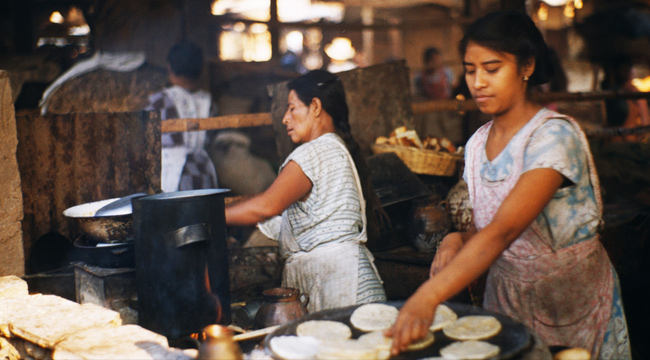
Once upon a time, two women from Portland, OR went on a road trip to Puerto Nuevo, Mexico. While there, they gorged themselves on the small village’s famous lobster burritos wrapped in handmade flour tortillas. They liked these tortillas so much that they studied them — seemingly without implicit permission or by paying one of the local “abuelitas” as a guide. Months later, they unlocked the recipe for making these tortillas through trial and error and started a breakfast burrito pop up inside of a preexisting taco cart.
The response to Kook’s San Diego-style, potato-infused gut bombs was overwhelmingly positive. Then an interview ran in one of Portland’s two independent newspapers, Willamette Week, in which the two young women came off as… flippant? Cocky? Imperialistic? Young? How you feel about the attitudes reflected in the article will depend on who and to what degree you bestow the benefit of the doubt. And who and to what degree you bestow the benefit of the doubt to will depend on all sorts of factors connected to how you were raised, what culture you were raised in, feelings of marginalization, and your personal take on the notion of food appropriation.
Here’s the quote that launched a thousand negative Yelp reviews:
“I picked the brains of every tortilla lady there in the worst broken Spanish ever, and they showed me a little of what they did,” Connelly says. “They told us the basic ingredients, and we saw them moving and stretching the dough similar to how pizza makers do before rolling it out with rolling pins. They wouldn’t tell us too much about technique, but we were peeking into the windows of every kitchen, totally fascinated by how easy they made it look. We learned quickly it isn’t quite that easy.”
The comments on the piece blew up. People were angry, then other people got angry at the angry people, and the conversation showed signs of slipping out of control. It didn’t though; not quite. Amidst the occasional name calling and overly-authoritative statements, there was some genuine insight.
Consider this salvo:
Jen:
Sooooooo, let me get this straight. Are you all suggesting that Andy Ricker close Pok Pok? Should John Gorham close Toro Bravo? What about Expatriate? Should we force Kyle to stop serving Laotian tacos? Are you going to try and convince me you’ve never stood in line at Por Que No? Um, Bollywood Theater anyone? If learning how to make a food from another culture and selling it is now considered cultural appropriation, then why not take this issue up with the successful PDX businesses that have been doing this at a much larger scale for years, and stop harassing these two women struggling to start a small business. THX.
And this sharp response:
Gabeh Lissette Gutierrez:
“Learning how to make food from another culture”-implies some sort of collaboration. This article makes it clear they were given the basic recipe and when the cooks did not want to share more, these women then went further and purposely looked through the windows of their establishments to steal the rest of the technique. I doubt you’ve ever been to Puerto Nuevo, but my family took me there every summer up into my teens. Its honestly the smallest cluster of businesses, just outside of Rosarito, with each restaurant usually being family owned with a unique family guarded recipe of their tortillas. It doesn’t matter if this stupid pop up will ultimately hurt the businesses in Puerto Nuevo, its the complete lack of respect and sense of entitlement they went about stealing the recipes when they were purposely not given the complete technique.
There are interesting thoughts percolating there and interesting ideas to contemplate. A day later, a headline from Mic.com brought the story to a national audience:
Then Portland’s other independent weekly, The Portland Mercury, wrote a piece called “This Week In Appropriation Kooks Burritos and Willamette Week.” The conversation went viral. Kook’s Yelp reviews fell off a cliff, the young owners went into hiding, and the cart shuttered. Plans for expansion were scuttled.
As the story broadened, it became clear that this is a conversation that both the food world and the city of Portland needed to have. A group of activists created a list of alternatives to restaurants deemed appropriative, and food media came under scrutiny. Kooks Burritos — named for surfers who venture into waters too heavy for them to handle (which seems all too fitting now) — started a conversation that is worthy and important.
In light of all of this, and feeling troubled by how shallow these discussions often remain, I asked food writers Zach Johnston, Delenda Joseph, and Vince Mancini to discuss the issue (with me) in a round table format. It’s easy for the media to shirk these stories and keep the surface level and we want to do the exact opposite.
If you’d like to share your own take, your thoughts and insight are valued.
ZACH’S MAIN COURSE

I’ve talked about cultural appropriation before. It 100 percent exists and happens all the fucking time. Using Hollywood-inspired iconography of American Indians for sports teams is probably one of the more egregious examples. But even that has its exceptions. Cleveland adopted its team name based on Louis Sockalexis, a Native American player from Penobscot Indian Reservation. It was a worthy honorific until the Cleveland Indians pissed away all that goodwill with an insanely racist mascot that persists to this day. I’m telling this story for context. The best intentions can lead to really shitty outcomes.
Now I have to turn that lens on myself. I’ve traveled to 64 countries so far. One of the biggest reasons I travel was to explore and absorb food culture. I don’t leave a country until I’ve talked to a chef and a bartender at least once. I soak up recipes and techniques everywhere I go. I can make a killer naan and chapati because of six weeks of roadside breakfasts in Penang. My momo skills are on point due to hanging out with a Nepali refugee in Darjeeling. I pride myself on being able to make authentic and delicious plates of carbonara or bolognese just like they do in Rome and Bologna.
Food is the greatest binder of people. I’ve worked in kitchens under chefs I didn’t share more than 50 words with, but we were still able to communicate through food. That’s magical. So for me, the idea that me making bolognese or momos is cultural appropriation or somehow equates to grotesque American Indian iconography is madness. But, then that’s me talking. I know people try to make someone else’s food and mangle it. I’ve had to eat shitty pho made by a German. That’s where things get muddied, my intentions are not everyone else’s. And I don’t want to be the one who honors Sockalexis only to see that honor turn to horror. Which is to say, I’m conflicted.
STEVE’S MAIN COURSE
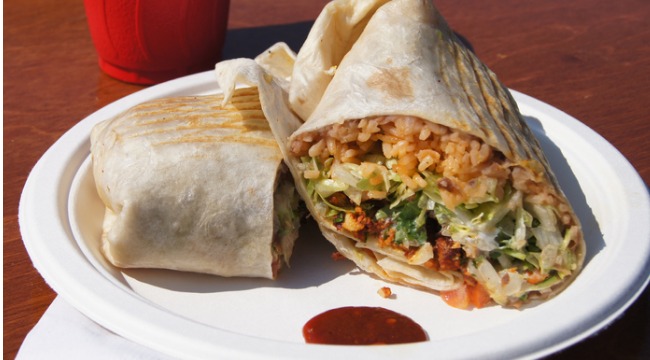
The idea of food appropriation, to me — because of my work — often revolves around how food writers handle said appropriation. Cultural exchange is generally agreed to be awesome, but when it gets filtered through the food media it becomes Bon Appétit’s video called “PSA: How to Eat Phô.” That’s an over-reaching take on a food with a storied, fascinating history, which comes from a country that has very mixed feelings about American imperialism. Meaning, yeah, study phô, fall in love, go to Vietnam to practice the dish, even open up a phô chain, but don’t act like you invented the stuff or that your way is the one right way. That’s just dickish. (For what it’s worth, the outlet changed the headline of the and they copped to their mistake.)
This case seems quasi-similar to the phô story because the founders of the restaurant do come off like “takers” rather than “exchangers.” Am I reading that right? Tough to say, not being able to hear their inflections. Predatory and “really-excited-about-tortillas” can read very similar in print. The real controversy came after Mic did a breakout, starring the one freewheeling quote mentioned in the intro. To me, that doesn’t exactly sound like someone who is trying to disrespect Mexican food culture, but Mic’s headline sure did:
The White Cooks Bragged About Stealing Recipes From Mexico To Start A Portland Business
Considering that Mic.com doesn’t allow for comments and hasn’t followed the piece up, that headline feels like it dances on the edge of courting controversy — especially since the author didn’t take a particularly hard-line stance on the matter.
I’m trying to pull back the curtain on the media coverage of these stories for a reason: There are multiple levels of journalistic responsibility in regards to the food appropriation conversation: 1) Food writers need to stop anointing white chefs as the ambassadors of foods that developed in places where the residents have been victims of American bigotry. It’s happened with everyone from Rick Bayless (Mexican food) to Andy Ricker (Thai food). That’s not to say that the two chefs deserve no coverage, it’s just to say: “Damn, food media, stop creating white savior stories.” 2) Food writers need to tell the stories of mom and pop shops, hidden gems, bodegas and… people like Sean Sherman. If you’ve followed Sherman’s story on Uproxx, you’ll note that we covered it from a variety of angles. Why? Because these stories are told far too rarely and they’re important. 3) When controversies pop up we need to talk about these things. Splashy headlines and Twitter shout downs only go so far. What the world needs is brave, clear-eyed conversation about the massive systems of food growth, production, and consumption in America. I don’t think we’re getting that from food media, instead, we get outraged.
So that’s my first take: 500 words just to say, “This conversation needs to happen and the food media needs to be a part of it.”
DELENDA’S MAIN COURSE
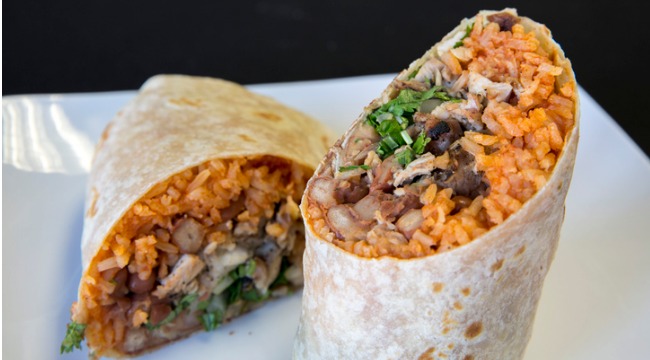
Food appropriation is real. Living in New York City, you see so many “cute little Ethnic spots” that are really owned by white people wanting to get in on the action. I tend to avoid those places in favor of more authentic eateries because I know that my money is being used to support a small business that the owner probably had to fight tooth and nail to finance given the racism in lending (which is a whole other story altogether but is also definitely part of this issue and the sensitivities around this conversation). I know that money will be used to support disenfranchised families and communities. There’s just something so fucked up to me about someone making money off of someone else’s culture and then not sharing the profits. The money travels, but it never gets to the culture that’s being appropriated.
If there’s a genuine love for the culture and it’s not rooted in money or Columbusing, but in real affection and appreciation, then it will naturally lead to profits being shared. Then it can work. If you’re going back to the source, interacting, getting permission to share with the rest of the world, it can work. If you’re taking things and putting your own spin on them but not in a thinly-veiled “I discovered this” Columbusing way, then it can work. But this seems out of the scope of all of those.
I don’t know if the technical term is “food appropriation” or if I believe you shouldn’t make other people’s foods, but the whole thing just feels par the course for white folks to come, peek in windows, and profit. For me, it’s just more white people white people-ing.
VINCE’S MAIN COURSE
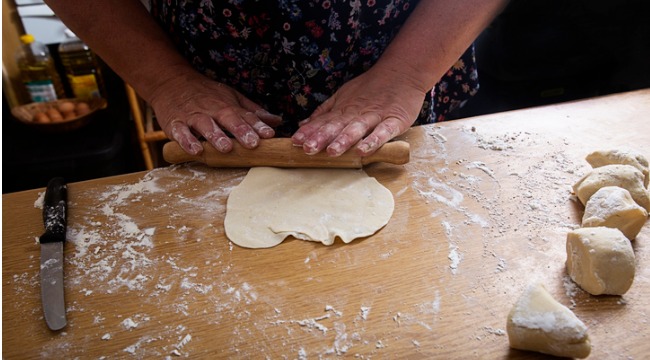
This, like a lot of cultural appropriation stories, seems to me to be putting too fine a point on common sense. A lot cultural appropriation essentially boils down to “don’t be a poseur, don’t be an asshole.” I hated Matisyahu long before I knew there was a word for what happens when some Jewish kid from the burbs grows dreads and decides he’s a reggae star. I didn’t know he was appropriating, I just thought he seemed like an asshole.
I’ve always been a little resistant to put a heading on it, precisely because it seemed like it could lead to situations like this. The thing about culture and race is that it’s blurry and always has been. Drawing hard and fast rules about what is and isn’t cultural appropriation necessarily involves drawing hard and fast line between cultures, which makes me uncomfortable. It’s easy to tell white people not to paint their faces black and do minstrel humor or not to paint them red to become the racist caricature from their favorite sports team’s mascots. Because, again, don’t be an asshole. Don’t buy into some old neighborhood and start telling people there how to act — that’s what assholes do. But it becomes a little worrisome when we start trying to figure out which color people are allowed to cook which kind of food.
The quote that everyone seems hung up on, about the Kook Burritos folks “picking the brains of every tortilla lady there [Puerto Nuevo, Mexico] in the worst broken Spanish ever,” yeah, it sounds a little assholey. But more in a slightly obnoxious gushy sorority girl way than in a culturally insensitive way. If they truly went to some taco lady and stole her exact recipes, yes, that would be bad. If they just came back wanting to eat more of the delicious food they had, well, that sounds like just about every restauranteur ever.
If you want to boycott the white girl Mexican food restaurant in favor of a “more authentic” place with food cooked by actual Mexican folks, by all means. I probably would too. But let’s not pretend this is some act of social wokeness sticking up for POCs. The act mostly really boils down to being a hipper gentrifier. That they had to cancel their restaurant plans sounds like a partly misguided expression of mass dissatisfaction over a bigger problem — that lily-white Portland could use some diversity, in restaurants as in everything else. And, as Steve points out, food writing has had a terrible habit of ignoring the delicious hole-in-the-wall ethnic places to write puff pieces about whitey-come-latelies and their investor-backed “ethnic-inspired” fare. That’s the thing about investor money, you can use it to pay publicists. Some of the anger is understandable, and justified, I’m just not sure the solution is dragging some white people for wanting to sell food they like.
Another problem with the cultural appropriation hysteria — if that’s truly what it is. As Steve pointed out, the Mic piece was a perfectly even-handed look at the controversy, aside from the headline, which was typically sensational and click-baity. And that’s just capitalism’s effect on news. It’s the shitty model we’re all stuck with that no one wants, like an athlete during the steroid era trying to decide how much cheating they can live with to compete against a bunch of other cheaters.
Digression aside, assuming there is some deserved hysteria, wildly overblown as it probably is by the online news model, the problem with over applying the “cultural appropriation” tag is that it doesn’t leave white people a lot of great options. First of all, can you even appropriate when white culture is mostly defined by appropriation? What was the age of exploration if not a bunch of white people sailing around the world pointing at stuff that had been there thousands of years and saying “mine” like the seagulls from Finding Nemo? Going to a foreign land and bringing the cool foods you find there back to your home country is a tradition older than tacos. It’s not a good tradition, sure, but I’m not certain a world where white people only cook mayonnaise sandwiches and bratwurst is better.
ZACH’S SECOND SERVING

“First of all, can you even appropriate when white culture is mostly defined by appropriation?” as a Native American (who’s half white), I find truth in this. If you go back far enough, what even is a national or cultural food? First of all, you’re dealing with “national identities” that really only goes back to the 1800s. Secondly, what the fuck is pizza without cheese from Italy and tomatoes from the New World? What are Goan vindaloos without fish from the Indian Ocean, rice from India, and tomatoes and chilis from the Americas? Swiss chocolate’s main ingredient is another New World treat. Food has always been driven by transference. So a Portuguese colonist and Goan kitchen made up a curry and then I want to sling that dish on the streets of Seattle as a half Native and half European American. Is that appropriation or adoration? Isn’t that multiculturalism? Isn’t that unity?
Saying that people can’t cook another culture’s food that they adore and bring that food home to open it up to a wider audience is the same as saying Joe Rogan or Vince Mancini are culturally appropriating Brazilian culture because they practice Jiu Jitsu. Martial Arts — like cooking and eating — is a unifier, not a divider. And we can’t dismiss logistical reality. 70 percent of Americans are white. Cooking is a trainable and malleable endeavor. White people are going to make samosas, tacos, and bratwurst in America. And American food culture is better for it.
Chefs like Rick Bayless may seem like he’s appropriating Mexican food. He’s made a career off of cooking a food that’s culturally adjacent to his own. He’s lauded as the foremost American expert on the cuisine. Why? Because he’s spent a lifetime studying it, loving it, and cooking it. Is it authentic? No. Does it have to be? No. What Chef Bayless has done is opened up a style and cuisine to a new audience. Hypothetically, people are going to eat at Bayless’ resto. For many, that’s going to be their introduction to a Mexican cuisine that isn’t working class based. That will open a new world to that diner and they will invariably seek out other and more authentic experiences in that cuisine. And that’s where the Kooks folks fall in. They traveled (a good thing). They learned (a good thing). They made burritos (a Cali-Mex thing). And they failed to hire a good PR agent to mold their story into a less brassy narrative.
My last point is a bit more micro: I don’t think you can appropriate food. It is illogical. Go into any kitchen in an immigrant-heavy nation and you’re going to find all sorts of cultures cooking every cuisine you can imagine. Bourdain touches on this in his early episodes by highlighting his Hispanic staff who are cooking French fare. Are those guys appropriating French culture? Or are they just working a job they know how to do? How does that even make an appropriation argument possible? Because you can’t have it both ways.
Cultural appropriation is when you highjack another group’s culture and use it to oppress that group. If Mario Batali makes me a taco, he’s not oppressing Baja Mexicans. He’s celebrating them. I’d prefer his spaghetti and meatballs, but you bet your ass I’ll eat his tacos all day. Saying people are appropriating food (in general) dismisses what food is and at the same time diminishes real, vitriolic appropriation that happens on a daily basis.
STEVE’S SECOND SERVING
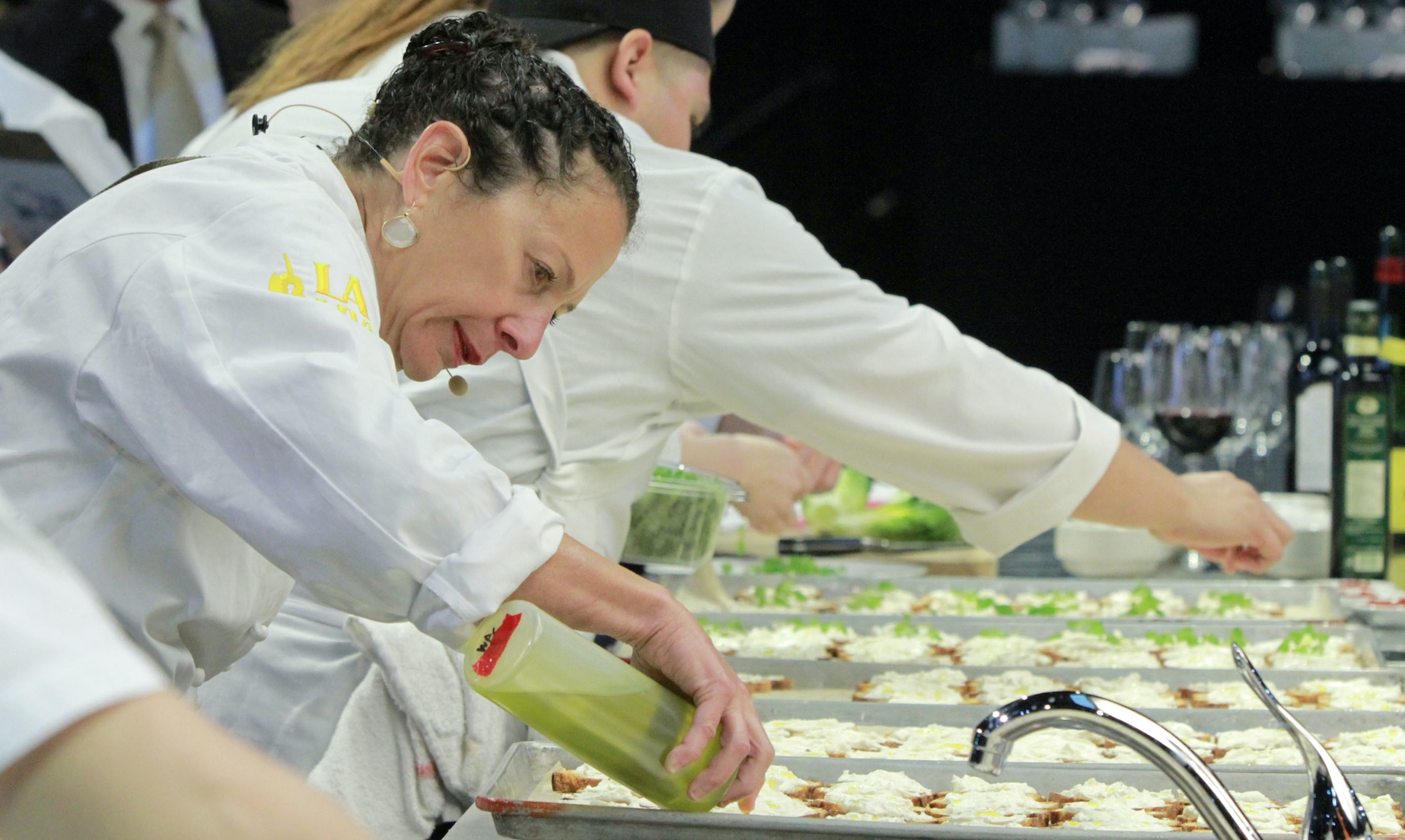
As Vince pointed out, it feels like there’s a pretty simple recipe for not appropriating which is, essentially: be humble. Be nice. Be respectful of other cultures and the power imbalances between them. Especially if you’re white. Because cultures remix one another, that’s unarguable. But in that scenario, white people have historically hogged the turntables. And as Delenda points out, when it comes to raising money for new turntables, the white people always get financed first.
Here’s the truth: Mexican Americans are grossly underrepresented in our culture (particularly in movies and TV, where they are even more underrepresented than other underrepresented minorities). The appropriation scale is therefore different if Zach was upset about someone trying to Columbus some fast-casual Native American cuisine, or Delenda being upset about someone co-opting foods that have root in African American history, than Vince or me getting pissed about Chef Nancy Silverton “revolutionizing” pizza.
Silverton is a good note for me to end on. The chef famously went to Italy to learn pizza dough, just like the women behind Kooks went to Puerto Nuevo to learn tortillas (though I will say that it seems like Silverton was willing to pay for her apprenticeship and the Kooks ladies didn’t). Mario Batali — an Italian and Silverton’s partner in the Italian restaurants she owns — said this about her pizza dough:
“Her pizza dough is almost anti-Italian. Her recipe is incomprehensibly long, it’s inefficiently long, it’s ineffectively long… but the result is perfect.”
That seems like a cool standard we ought not to forget: “Did you study enough to break the rules? Did you create something exciting?” I’ve tasted Nancy Silverton’s pizza and I’ll tell you: It may not be traditionally Italian, but it’s fucking thrilling. We’ll never get to taste the Kook’s tortillas, so we’ll never know if they were worth all this fuss or not.
DELENDA’S SECOND SERVING

You guys are giving a benefit of the doubt that I don’t agree with: Those women knew what they were doing. By their own admission, those sweet old Mexican tortilla makers shared bits and pieces but *wouldn’t* share with them everything. Gee, I wonder why? Did you put money up? I’ve seen a fair amount of Food Network shows. Nobody ever gives up the one thing that makes their dish special because that’s fucking stupid. They’ll rattle off all the ingredients for their award-winning sauce but won’t say what’s in the seasoning “that dates back to the war.”
So when the tortilla makers wouldn’t spill secrets, the women went “peeking into the windows of every kitchen” like a bunch of creeps. Only to come back and start slinging tortillas out the van and lining their pockets with the profits. It’s immoral as fuck and I’m pretty immoral. And the caucacity of the women to tell their story in such a “Haha! We totally just went to Mexico, stole some information and set up shop in Portland using said information! Lolol! So badass!” way — I can’t tell if they didn’t think what they did was wrong or if they just didn’t care if everyone knew. Either way, I do find it infuriating.
VINCE’S SECOND SERVING
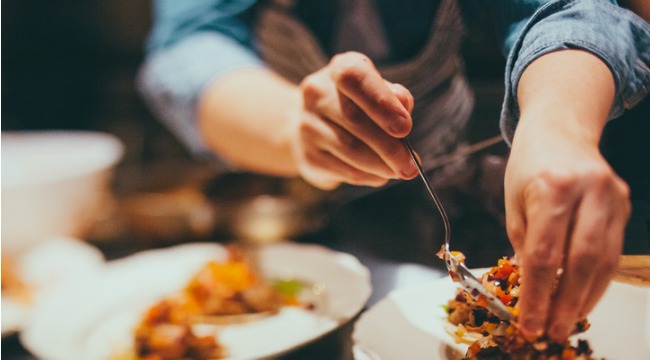
Knowing what I know about the situation, it doesn’t sound like Kooks Burritos deserved a public shaming. It sounds like a case of the click-bait news model (brought to you by capitalism™) ginning up a collective eye roll into a mass dragging. I think the eye roll was a reasonable reaction. You roll your eyes and swear you’ll only go to your favorite “real” Mexican food place (which unbeknownst to you is probably owned by a Lebanese dude) for a few months, and then you eventually get end up at Kooks and even though it’s not the same, it’s probably tasty in its own right.
Think of Chipotle. Is it Mexican food? No, not really. I don’t even think of it as in the same category. But there are times when I still eat it. It’s fine.
People can do their takes on other people’s food, it can be good. Just like when Marco Polo appropriated noodles from the Chinese and it became pasta. I don’t want to have to try to figure out whether the Poles or the Russians invented the pierogi/piroshki before I eat it, and I don’t have to know in order to decide whether it tastes good. Let’s all just eat good food and try not to be assholes.






